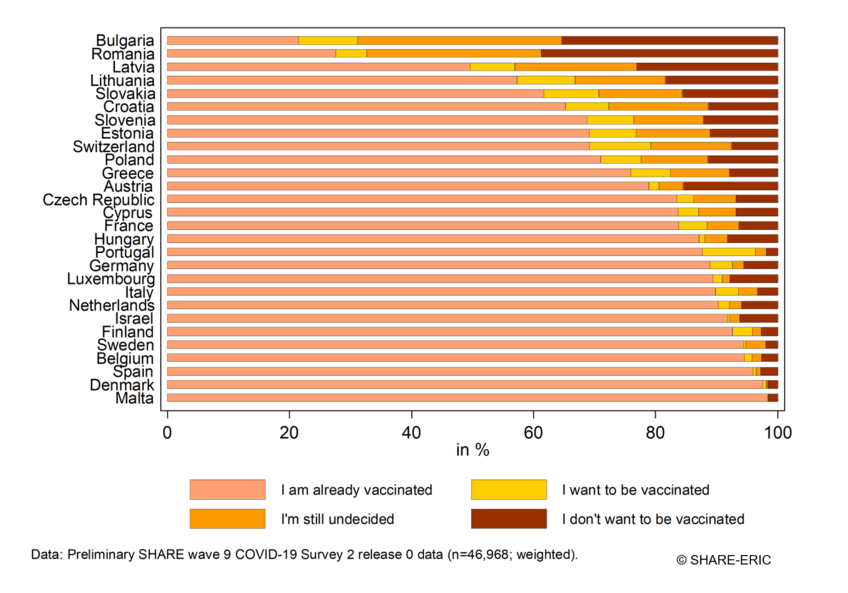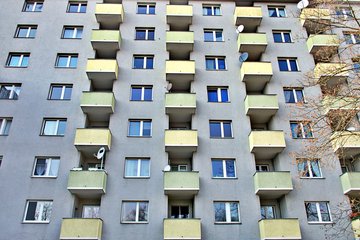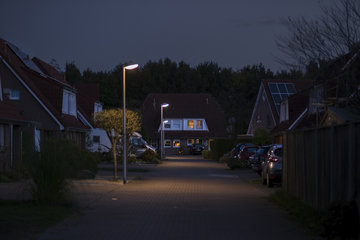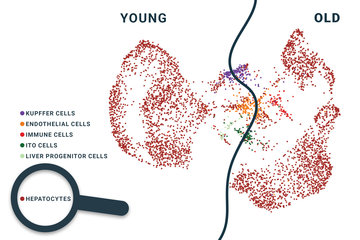Who are the unvaccinated?
Researchers analyzed the willingness of elder people in Europe and Israel to get vaccinated against Covid-19
A study reveals which factors influence the willingness for vaccination across Europe. To find out more about people who do not want to be vaccinated or are still undecided, a research team from the Max Planck Institute for Social Law and Social Policy used data from the second SHARE Corona Survey. SHARE, the Survey on Health, Ageing and Retirement in Europe, very recently collected data on vaccination uptake and a number of influential factors for about 47,000 individuals in the high-risk 50+ age group across 27 European countries and Israel.
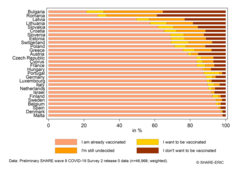
Around 18 % of the respondents in all 28 countries reported by the survey period in summer 2021 that they have not been vaccinated. However, there was great variation across countries. As shown below, Malta, Denmark and Spain were in the lead with over 95% of respondents vaccinated and Romania and Bulgaria trailing behind with about 28% and 21 % respectively. Of the unvaccinated SHARE respondents, 33 % reported that they were still undecided, while 45% stated that they didn’t want to get vaccinated. In Romania and Bulgaria, the countries with the lowest overall vaccination rates, about 40 % were undecided about the vaccination, and 54 % (Romania) and 45 % (Bulgaria), stated that they did not want to get vaccinated at all. Even if a considerable number of the undecided could be swayed to get the vaccination shot, the high number of vaccination refusers will make it very hard to reach herd immunity via vaccination in these two countries. The same applies to other countries, in which the share of vaccination refusers based on all unvaccinated 50+ respondents in a country is rather high, such as in Latvia (46 %) or Lithuania (43 %).
Who are the people who are still unvaccinated?
In a next step, the researchers considered the demographic, socio-economic and health situation of those respondents who are undecided or deny the vaccine. The researchers revealed that the economic situation is the strongest predictor of refusing the vaccine or at least being undecided: People within the lower quartiles of the income distribution more frequently did not want to be vaccinated or were undecided to do so, while the opposite was true for higher income quartiles. This finding was supported by the respondents’ subjective reports of how hard it is for them to “make ends meet”: Nearly 30 % of people who stated that they could make ends meet only “with great difficulties” were undecided or refused vaccination, while it was only 7.8 % for those reporting to be able to make ends meet “easily”. This clear pattern remained also when looking at country differences. When considering employment status there was also a considerable difference between (self-)employed, retired and respondents with other (non-)working status. This difference was greatest between unemployed respondents, of whom 28.5% were undecided or opposed to getting vaccinated and retired, of whom 11.5 % had opted out of or were still undecided about the vaccine. One explanation may be the age effect, as retirees are older on average.
The role of education: People with post-secondary education are less sceptic
While among those with primary education, the share of people who are undecided or refuse vaccination was about 14.7 %, it was 16.1 % in the group with secondary education, but only around 9.2 % among individuals with post-secondary education. This shows that educational differences are most prominent when comparing the highest level of education with the two other groups. People with post-secondary education are substantially less sceptical towards the vaccination. This finding was strongest in Bulgaria, Romania and Slovakia.
Gender and Age: Women and respondents younger than 65 are more likely to deny
Age also plays a role: Respondents between 50 and 65 years are more likely to refuse the vaccine than older respondents and this applies to nearly all countries. Additionally gender is a factor for attitudes towards immunization: Women were more likely to be hesitant than men. On average, 14.5 % of the women were undecided or refusing the vaccination, whereas only 12.8 % among men. But not in all countries: In Hungary, Portugal and Switzerland for example, it seems that there were more males who were still undecided or didn’t want to get vaccinated.
The healthier people are, the more likely they are to reject or be indecisive
Regarding health, respondents without a diagnosed physical illness had a higher probability of being undecided or unwilling to be vaccinated (16.9 %) compared to those with at least one diagnosed illness (12.4 %). This difference was strongest in Hungary, Lithuania, Luxembourg and Switzerland.
People knowing someone severely affected by the virus are more willing to be vaccinated
Further, the researchers found a difference between those people who stated that they didn’t know anyone physically affected by COVID-19 and those who did. Of those who do not know anyone affected, 14.7 % reported being undecided or unwilling to get vaccinated. The number slightly decreased to 13.7 % for people that know somebody mildly affected (any symptoms or positive test) and further declined to 10.3 % for those that know somebody severely affected (hospitalization or even death in close vicinity) by COVID-19.
To conclude: There is a West-East gradient: a high rate of vaccination uncertainty and refusals across most of the Eastern European and Baltic states compared to the other European regions in the West, South and North of Europe. Additionally, the researchers found, that people with economic difficulties and lower incomes, as well as those with lower educational status, were less likely to opt for vaccination. Moreover, physical health and being directly affected by COVID-19 in the immediate environment also played an important role.
